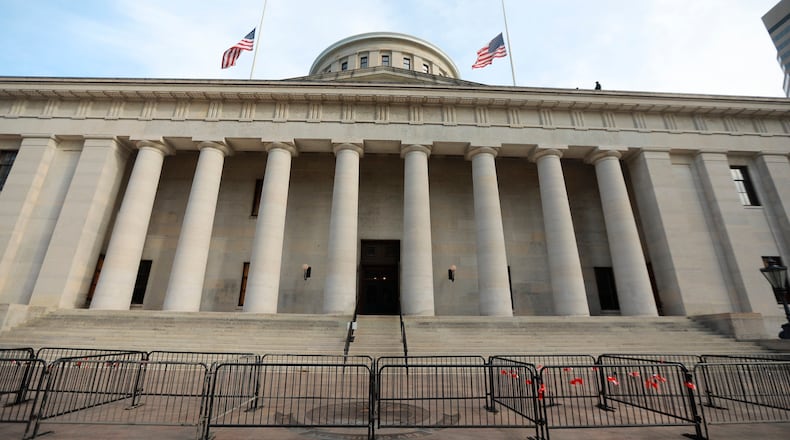“State officials, not federal courts, draw state electoral districts. But what happens if states fail to do so – no elections? The U.S. Supreme Court has given a clear answer: Federal courts must impose new maps to protect the right to vote,” Thapar and Beaton wrote, citing a 2003 case. “But they must do so only as a last resort, after giving states every opportunity to carry out elections consistent with state law.”
The panel’s third member, Algenon Marbley, chief district judge of the Southern District of Ohio, dissented in the ruling on Gonidakis v. LaRose, a Republican-backed lawsuit filed in the seven-month legal fight over legislative redistricting.
In a news release, the Equal Districts Coalition, an Ohio group of over 30 organizations including the Ohio State Conference of the NAACP, called the decision a win for Ohio voters, “as a panel of federal judges rightfully chose to leave decisions involving Ohio’s constitution and Ohio’s legislative districts up to Ohio’s highest court for the time being.”
But the League of Women Voters of Ohio, a lead plaintiff in the state-level case, saw it differently.
“For our representative democracy to work, Ohioans need districts that are fair and responsive to voters, rather than rigged for partisan political interests,” said Jen Miller, LWV of Ohio executive director. “We stand ready to work with the Ohio Redistricting Commission to create maps that truly uphold the Ohio Constitution and the rights of every Ohio. Time is of the essence so let’s bring back the independent, nonpartisan mappers to get the job done right.”
Long-running legal fight
The seven-member Ohio Redistricting Commission, which consists of five Republicans and two Democrats, has been working on legislative district maps since last summer. But every set of maps the commission has approved – none which passed with Democratic support – immediately faced legal challenges. In a series of 4-3 rulings the Ohio Supreme Court has rejected four sets of maps as unconstitutionally gerrymandered to favor Republicans – most recently on April 14.
The court had ordered a de facto reduction in Republican districts by insisting on a proportion of seats that met Ohio voters’ actual preferences in the last few elections. That breakdown is 54% Republican and 46% Democratic. Under the maps in place since 2012, Republicans hold a supermajority in both houses.
In rejecting the commission’s third set of maps, state justices ordered commissioners to draw all-new maps by March 28 with the help of outside experts, making the process public for the first time.
The commission hired mapmakers Douglas Johnson and Michael McDonald to work with commissioners’ own staff members, and live-streamed the work. But their maps weren’t quite complete on the afternoon of March 28, so they asked commissioners to approve a rough draft and allow them to make technical corrections in the following few hours. Instead, commissioners voted 4-3 to ignore the mapmakers’ work and approved a slightly tweaked version of already-rejected third plan.
State justices ordered the commission to try again, setting a deadline of May 6 for a fifth set of maps.
Federal intervention
The federal panel’s majority opinion says the state Supreme Court cannot impose maps itself, instead telling the Ohio Redistricting Commission to try again.
“And each time, the Commission’s effort has failed to survive judicial review,” Thapar and Benton wrote. But the commission’s fifth attempt – if made – is not due until May 6. That’s past the last date election officials say they need to fully prepare for a House and Senate primary that won’t interfere with the November 8 general election.
The likely date for that second primary is August 2, when some local tax levies are already on the ballot.
The ruling says the third map set has “one significant advantage” – counties had already begun planning to use it before the Ohio Supreme Court rejected it March 16. Much of that preparation wouldn’t have to be redone, so using it would be faster. But waiting beyond May 28 for state action would be inviting “electoral chaos,” the ruling says.
“Handed a menu of unappetizing options, we defer ordering Map 3 as long as possible – a final pause in hope that Ohio finally approves a map that complies with federal and state law,” Thapar and Benton wrote.
Ball in commission’s court
In his dissent, Marbley agreed with Thapar and Beaton on most issues but called the third map set “irredeemably flawed,” proposing instead to order implementation of the plan drawn by Johnson and McDonald.
The third set of maps would ostensibly create 54 Republican and 45 Democratic House seats, with 18 Republican and 15 Democratic Senate seats. But of those, 19 House and seven Senate seats would lean Democratic by less than 4%, while no Republican districts would be that close.
To get those overturned maps imposed for this year’s elections, all the commission has to do is run out the clock.
The redistricting commission has not announced any upcoming meetings despite the Ohio Supreme Court’s May 6 deadline or the federal judges’ May 28 deadline.
On Monday the redistricting commission’s two Democratic members, state Sen. Vernon Sykes of Akron and House Minority Leader Allison Russo of Upper Arlington, sent a letter to the five Republican commissioners asking for the body to reconvene and work on new maps, with the assistance of the independent mapmakers.
Sykes and Russo renewed that call in a second letter Thursday, noting the federal judges’ new deadline.
A spokesperson for the other co-chair, House Speaker Bob Cupp, R-Lima, did not reply to questions on when or whether the commission would meet again.


